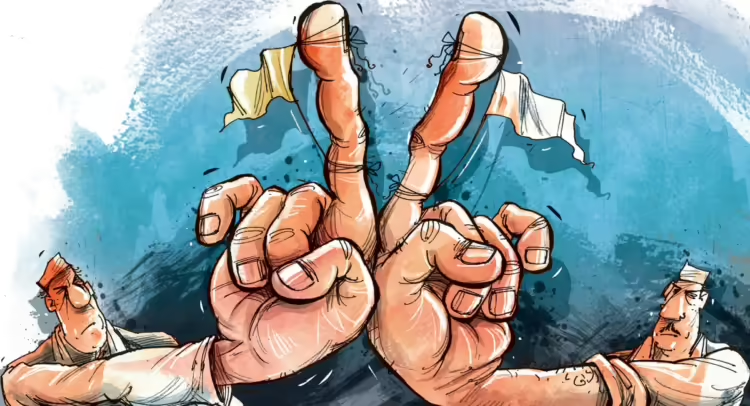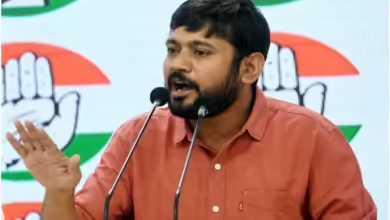Madhya Pradesh: The War for Vindhya and Mahakoshal
On April 19, the first phase of elections will be held in six seats in the tribal-majority Mahakoshal and Vindhya area of eastern Madhya Pradesh. The six seats include Mandla-ST, where Union minister Faggan Singh Kulaste is hoping to serve a seventh term in Parliament, and Chhindwara, which since 1980 has come to be associated with Congress member Kamal Nath.

Even though the BJP won five of the six seats in 2019 (Mandla-ST, Sidhi, Balaghat, Jabalpur, and Shahdol-ST), if the results of the 2023 assembly vote are taken into consideration, the race may be difficult, particularly in Chhindwara, Mandla-ST, and Balaghat.
The BJP’s district president, Vivek Sahu “Bunty,” is running against Nakul Nath, the MP son of Kamal Nath, in Chhindwara, the only Lok Sabha constituency that the Congress won in MP in 2019.
It’s a rematch of the 2014 election, which Kulaste won by over a lakh votes, between Union minister and six-time BJP MP Faggan Singh Kulaste and former minister and four-time Congress MLA from Dindori-ST Omkar Sigh Markam in Mandla-ST. But Kulaste’s chances of winning the Congress are improved by the anti-incumbency sentiment that caused him to lose the most recent assembly vote from his native seat of Niwas-ST. The 90-kilometer Jabalpur-Mandla highway stretch, which has been unfinished for the last ten years, is another source of Kulaste’s problems.
Both the BJP and the Congress have selected fresh candidates in the adjacent Balaghat seat: Bharti Pardhi and Samrat Saraswat, respectively. Veteran politician and former MP Kankar Munjare, who is running as a BSP contender after the Congress denied him a ticket, is opposing them.
Analysts predict that the election may finally come down to caste issues, with Bharti Pardhi, the lone OBC Pawar caste candidate, relying heavily on her 25% of caste supporters. Due to the influence of her political mentor and MP minister Prahlad Patel, who hails from the same OBC caste, she is also hoping to get 15% of Lodhi votes. Samrat Saraswat, a Kshatriya caste member running for Congress, wants to unite all non-Pawar caste supporters against the BJP nominee.
There will be a struggle between two fresh faces in the Jabalpur seat, which the BJP has not lost since 1996: Ashish Dube of the BJP and Dinesh Yadav of the Congress. Although they both have a reputation for being well-organized, this is their first time running for office in the Lol Sabha. Analysts claim that Jabalpur is the place where the Ram temple influence is most noticeable. Rakesh Singh, a four-time winner and current PWD minister in MP, won Jabalpur by the largest margin of 4.54 lakh among the five first phase seats that the BJP won in 2019.
Shahdol-ST and Sidhi, the two remaining seats, are located in the Vindhya area, which borders eastern Uttar Pradesh and Chhattisgarh on two sides. In Shahdol-ST, three-time Congress MLA Phoondelal Marko is facing off against former colleague Himadri Singh, a BJP MP and former Congress politician, despite Marko’s renal ailment. Marko is determined to defeat his opponent. However, Singh may have an advantage due to the efforts the Modi administration has done to develop railway infrastructure and measures tailored to the Baiga tribe, a particularly disadvantaged tribal population. Besides, Singh could benefit from the RSS’s infiltration in Shahdol.
Similar to the seats in the adjacent eastern UP, the Sidhi seat in the Vindhya area, which BJP’s Riti Pathak won the last two times by large majorities, looks to be another exciting race based mostly on caste. The BJP has put up Dr. Rajesh Mishra, a newcomer to the Sidhi seat, whose family runs a well-known hospital in the area. Along with former minister and CWC member Kamleshwar Patel, BJP dissident and former Rajya Sabha member Ajay Pratap Singh is also running as the GGP candidate. Laxman Singh Bains, an independent candidate, is making matters worse for Mishra.







